Veteran writer/producer David A. Goodman is a six-time Emmy nominee with an impressive range of credits, including Futurama, Family Guy, American Dad, Star Trek: Enterprise, and most recently, The Orville. But even with all that he has had time to express his life-long fandom by writing a number of in-universe Trek books, including the The History of the Federation, The Autobiography of James T. Kirk , and now the The Autobiography of Jean-Luc Picard, which was released today by Titan Books. TrekMovie had a chance to talk to the writer about what it is like to be the “editor” for such an illustrious Starfleet captain.
Finishing the puzzle of Picard’s life
Let’s start with the Picard autobiography.
You should know you play a role in the Picard book, because when you interviewed me on the Federation book, you caught what was a mistake, because I had named somebody Picard who was captain and you pointed out that Picard had no ancestors that had left the solar system. So, that is actually a really important part of the Picard book, that realization that as a kid that none of his great family had left the solar system, and that ends up being his drive. So, I just wanted to thank you for that and I mean that sincerely. You catching that mistake put it in my mind that I had to make that an important part of this book.
Thank you. That gets into my first question, which is that there is just so much material to work with for Picard. How much latitude did you have to fill in the gaps? How much can you create for your own story about Picard and his motivations and thoughts?
I see this job in the same way as I saw the Kirk book. I am starting with a half-finished puzzle. There is what we know about Picard based not just on the episodes and the movies, but also Patrick Stewart’s performance. It is my job to finish the puzzle so that the pieces that we already know fit into this larger picture. So I am not discarding any of the important pieces. As a fan of Star Trek, it is super important when you read one of these things that it not contradict some firmly held belief of who the character is. So CBS gives me latitude based on the respect they know I have for what has come before. They see that I want a story that feels original and feels like the story of a person’s life, but when you are dropped into the “Farpoint” mission, you want to feel like it is the “Farpoint” mission you remember.
Getting into Picard’s head
The conceit of this is you are “editing” this book on behalf of Picard. So, at what point in his life is it written?
The idea of the book is that he is writing this book as an old man, post Enterprise-E and probably around the future age we saw him in “All Good Things”, or maybe slightly younger. But, I do a bit of artistic license. When I am writing about him as a young man, it is written with sort of youth and energy, and as he gets older it is more sedate. In the Kirk book I really wrote him as a boy, when he was a boy. With Picard, you really wanted that sense that the guy writing it is that guy from The Next Generation. It is that considered, thoughtful, mature, intellectual guy. And he is writing it with some 20-20 hindsight about youthful indiscretions, his love life and whatever.
In both cases I take the view that both of these men are writing their autobiographies and they are going to be even more introspective than we have seen them, because it is a book. It is an autobiography, so they are going to be more self-critical and more honest about their fears and loves and passions. So, for example in the Kirk book, I take that scene in “Balance of Terror,” when McCoy comes into his room and he confesses incredible self-doubt, that gave me license to really explore that. I could explore that he had self-doubt, but he hid it. It was a similar kind of thing with Picard. He wasn’t consumed with self-doubt, but he had the ability to acknowledge he had made a mistake.
So, as an example of what you are talking about, how does Picard reflect on Q? Was he an enemy, or did he see Q as a friend who was actually trying to help him and the Federation?
It is interesting you say that. I don’t want to give it away, but there is a scene towards the end of the book where Picard talks about exactly that. He basically says, “You know what, Q is in my family.” That is a process that he gets to. When I am telling the stories, I am telling the story in the moment and trying to relay how he was feeling at that moment instead of writing it looking back and how he feels about it now. So, he doesn’t get to that feeling about Q until the end of his life and towards the end of the book, so you sort of build up to it. It is a really nice moment in the book that I really like that he sort of says he had to admit that Q had played this really role in his life and he was in his family.
Do you pull from the non-canon material, especially all the books written that take place after Star Trek: Nemesis?
I have read a few books over the years and have been inspired by them. I haven’t read the more recent books, to be honest. I did go back and look at David Gerrold’s novelization of the pilot. For this book there is less influence of the Star Trek books, and I am sure I contradict some.
So do you cover much of Picard’s life post-Nemesis? Do you have your own version of his later years?
I have my own story. It is probably shorter than people might like. I did a calculation about his age post-Nemesis and he is getting old – although perhaps not by 24th century standards – using the Okuda’s Chronology and Encyclopedia and figuring out the years. I wanted a little time with him as an ambassador, which I thought was a fun thing that was in a Next Gen episode. I also wanted a sense that he is getting older and his time as captain is coming to an end. For me as a fan his time as captain are the ones that we remember from Next Generation and I didn’t have a compelling story post-Nemesis. I also took to heart the message that you can’t go home again. We can’t recapture that great moment of time on the Enterprise those seven years.
Discovery gets nod in Picard book + Spock is next
With the History of the Federation book this is your third in-universe Trek book, are there any more in your future?
Titan contracted me for two more after the Kirk book, so the first is the Picard book and the next one will be for Spock.
Is that official?
I don’t know that it is officially announced, but there is a contract and they are paying me so I think it is happening. And I am writing it. And with the Spock book, for anyone who has also read the Kirk and Picard books, I am going to reward them. There are scenes in both the Kirk book and the Picard book that are then seen from Spock’s point of view in the Spock book. The third book will sort of tie the three books together, but it will also be its own story. I am very excited to write about Spock’s childhood and his early years in Starfleet before he became Kirk’s first officer.
And now he has an extra sister.
Yeah, I got to figure that one out. [laughs] I am reading Desperate Hours, which has some stuff about it. And actually there is a very brief nod to Discovery in the Picard book. If you blink, you might miss it. I was given a little something. Someone who read the book said “You could do this,” and so I did. It’s a fun thing for fans of Discovery, and if you aren’t a fan it goes right by.
Ambassador Spock of course left the prime universe to travel to the new Kelvin universe. So, did he write the book before or after he left?
I haven’t decided what to do with that yet. But, I think somebody finding his unfinished manuscript would be pretty cool. Like he was working on it and then he disappeared.
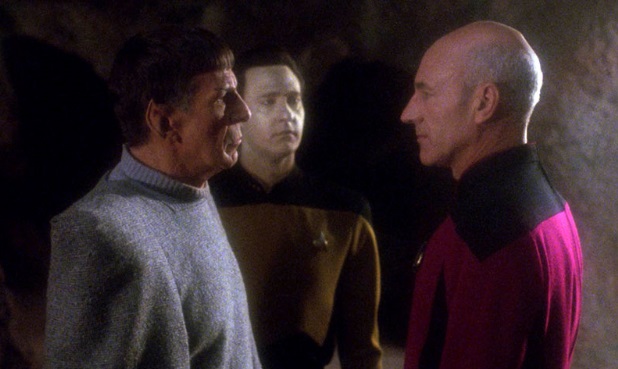
Goodman’s next bio will be for Spock and it will include scenes from the Kirk and Picard bios, but from Spock’s perspective
Available today
The Autobiography of Jean-Luc Picard,was released today October 17th in hardcover, and retails for $24.99. You can pick it up at Amazon for $18.81 or get the eBook version for $8.01.
More from Goodman
TrekMovie also talked to David A. Goodman about The Orville, Futurama, and his time with Enterprise, so stay tuned for that coming up later this week.

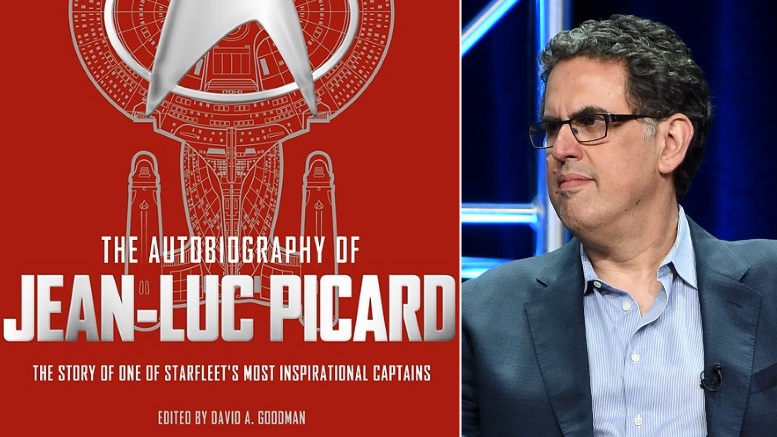
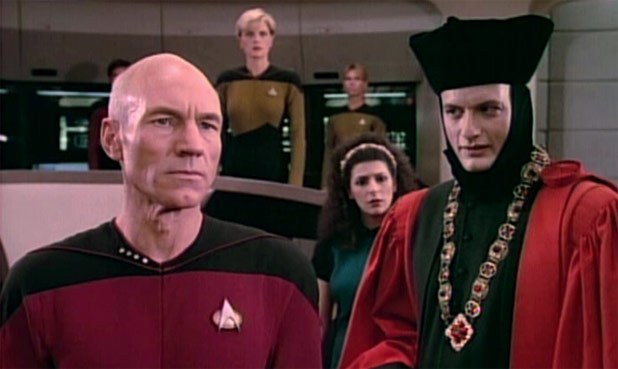
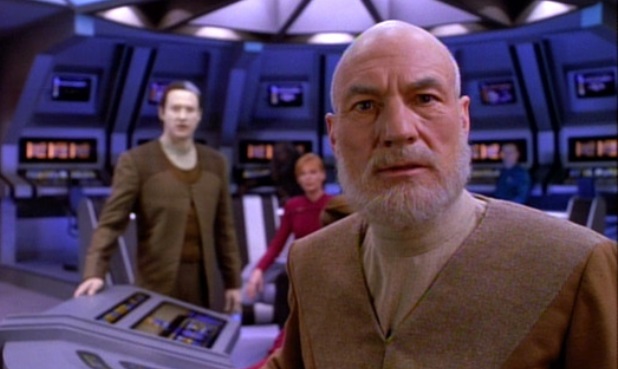
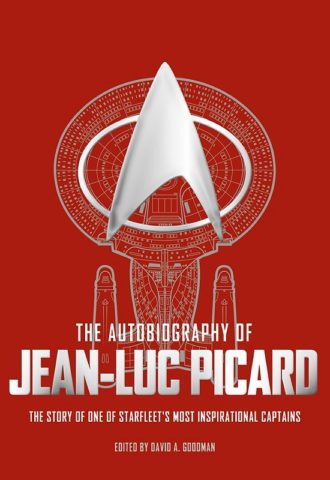
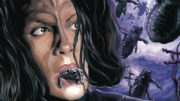
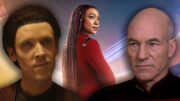
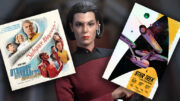
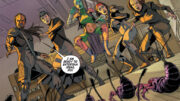
Sounds like a book that I might pick up.
I hope he writes a book about Archer one day.
“The Dog and his Captain”
I loved the Kirk book. Can’t wait to try this one!
Thanks Marcela!
Sorry, just reread this, Marcelo.
I’m glad Goodman still has time for Trek given his Orville responsibilities. And if you happen to read this, sir, thanks for “Where No Fan Has Gone Before.” If laughter is a gift in this sad old world, that was and continues to be a cornucopia of riches.
Thanks Michael, “Where No Fan…” was a career highlight.
Really? There’s a market for this kind of stuff?
I wonder what the approximate word count is on these books. Spock’s book in particular would be enormous if he’s focusing on his childhood, his adventures in Star Fleet, and encountering Picard. It is my sincere hope he gives a decent amount of time to Savik.
I hope he writes one for Sisko. Although it may be hard unless he reads the Relaunch books. We don’t know where the Prophets transported Sisko to exactly.
I looked for Picard’s autobiography. Then I read the blurb of Kirk’s autobiography: “From his birth on the U.S.S. Kelvin, his youth spent on Tarsus IV, his time in the Starfleet Academy…”
Mmmmm… U.S.S. Kelvin? Thanks, no thanks!